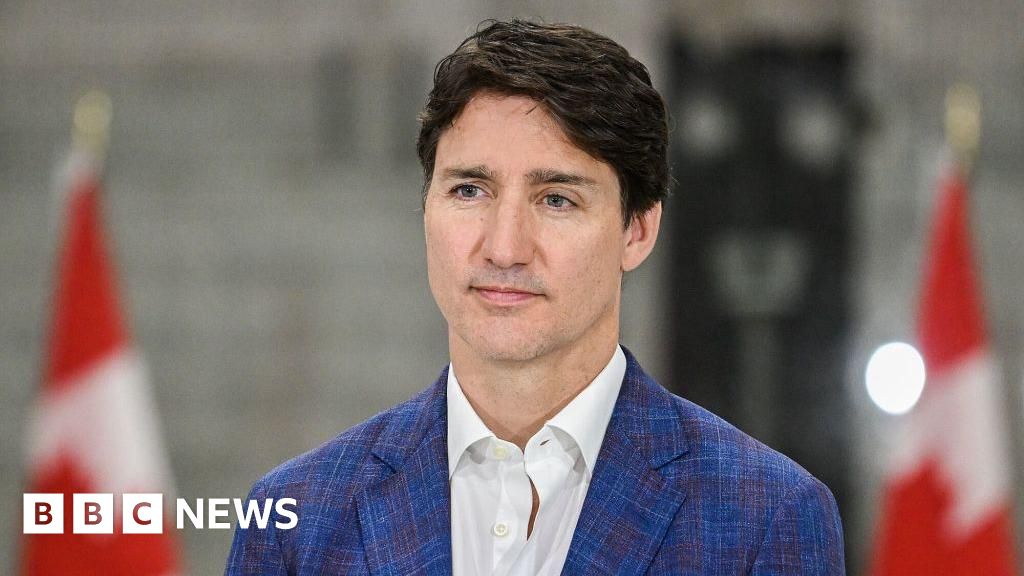Canada is under mounting pressure to increase its military spending as it continues to fall short of the target set out for Nato members, raising fears that the country is becoming an outlier among its allies.
That message is expected to be made clear this week as Prime Minister Justin Trudeau attends the Nato summit in Washington DC to mark the military alliance’s 75th anniversary.
Canada, a Nato-founding member, ranks seventh overall in the amount of money spent on defence among the 32-nation alliance.
But it falls way short of the alliance’s doctrine, which requires Nato countries to spend at least 2% of their GDP on the military.
Using that metric, Canada – which spends 1.34% of its GDP on its military – is ahead of only Slovenia, Turkey, Spain, Belgium and Luxembourg in the alliance.
By contrast, the UK spends just over 2% of its GDP on its military, while the US spends nearly 3.5%.
Canada’s defence budget currently stands at C$27bn ($19.8bn, £15.5bn), though the Trudeau government has promised in its most recent budget that it will boost spending to almost C$50bn by 2030.
Still, that would only make up 1.76% of Canada’s GDP, meaning the country will continue to lag behind its allies in the coming decade.
Frustration with Canada was made clear in a letter sent in May to Mr Trudeau by 23 bipartisan US senators.
“We are concerned and profoundly disappointed that Canada’s most recent projection indicated that it will not reach its two percent commitment this decade,” the senators wrote.
The US ambassador to Canada David Cohen has also taken note, saying in a recent interview with Global News that Canada is now “the outlier in the entire alliance”.
In less diplomatic remarks, US House Speaker Mike Johnson said on Monday that it is “shameful” Canada has not hit the 2% mark.
“Talk about riding America’s coattails,” he said.
In response, Canada’s defence minister, Bill Blair, said at the Foreign Policy Security Forum on Monday that the country will soon share a “credible, verifiable plan” to boost its military spending.
“I’m very confident that it’s going to bring us to that threshold,” Mr Blair said.
Meanwhile, Canada’s ambassador in Washington, Kristen Hillman, told reporters that while the pressure is on to step up, there is also “a strong recognition that Canada is a steadfast ally in all aspects”.
The alliance finds itself at a critical moment.
Member nations are dealing with a more aggressive Russia that is continuing to wage a war in Ukraine.
There is also the possible return of Donald Trump to the White House, who successfully pushed European Nato members to boost spending when he was US president.
Mr Trump has continued to speak on Nato spending on the campaign trail, once floating the idea of letting Russia “do whatever the hell they want” to alliance members who failed to meet targets.
If Canada does not meet its spending commitments, it could open itself up to pressure from Mr Trump if he wins November’s presidential election.
European allies may also grow resentful, said Christopher Sands, head of the Washington DC-based Wilson Center’s Canada Institute.
Canada is already feeling the consequences in other ways, he said.
It has ambitions to be part of US-led Indo-Pacific economic talks, which includes countries like Australia, India, Indonesia, Japan, Malaysia, the Philippines, Singapore, and South Korea.
But so far, Canada has been left out.
It has also been excluded from the AUKUS defence pact between Australia, the UK and the US.
“That’s where the real rubber hits the road for Canada. Nobody invites you to the conversation because – without wanting to embarrass you – they know you don’t have what it takes to be a serious player,” Mr Sands said.
Philippe Legassé, a Carleton University professor whose research focuses on defence policy and procurement, said there are a number of reasons why Canada lags behind in spending despite being a relatively financially strong country.
First, the Canadian public does not see defence spending as a priority when measured against other needs, like healthcare and other social services.
“Both major parties in Canada recognise that it is in their political interest to spend at a certain level that shows you are taking care of the armed forces, but not necessarily at a level where it begins to impact your other priorities,” Prof Legassé said.
Another reason is that, historically, Canada did not focus on its military spending as much because it was protected by nuclear allies like the UK and the US.
It saw its value in other collective security endeavours, including peacekeeping.
At the onset of the war in Afghanistan in 2001, deficits in Canada’s military capabilities became clear and launched a wave of spending, said Mr Sands.
But Canada is still playing catch up after decades of neglect and struggles when it comes to critical issues like procurement.
Aside from the pointed remarks by Speaker Johnson, experts anticipate much of the pressure on Canada at the Nato summit will be made behind closed doors, rather than direct criticism aimed at Mr Trudeau.
“It’s a little delicate because Canada is doing quite a bit in terms of tangible contributions,” Prof Legassé said.
That includes support for Ukraine and work leading the multinational Nato battlegroup in Latvia.
He added that US President Joe Biden and a number of other Nato leaders are ideologically aligned with Mr Trudeau, the Liberal Party leader, and would prefer not to pressure him publicly.
“They don’t necessarily want to give fuel to the idea amongst Canadian conservatives and the general public that the Trudeau government is failing miserably,” he said.

